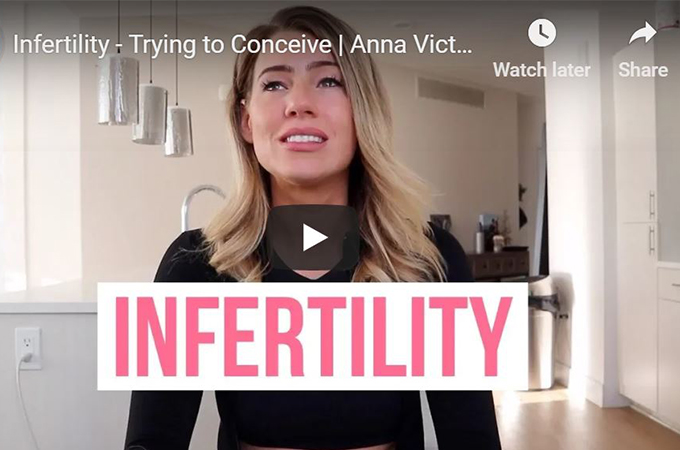Anna Victoria, a certified personal trainer and Instagram star, recently got candid with her followers about her struggles with infertility. Known for her cheery demeanor and bubbly personality, Anna tears up on camera as she talks about her personal and emotional journey to starting a family.
One of seven children, she thought getting pregnant would be easy. Victoria, 30, and her husband, Luca, 31, started trying to get pregnant in January 2018. After months of hopeful signs and “symptom spotting,” there was still no pregnancy.
“I never thought I would be struggling with conceiving.” Victoria continues, “It’s been a really hard 2018. For those of you who know me, I’m a personal trainer, I’m a fitness professional, I lead a very healthy lifestyle, but also a very balanced lifestyle.”
When trying to conceive, it is important to maintain a healthy body weight, get active, kick bad habits, and eat a balanced diet. For Victoria, all of these boxes were already checked. For someone who is so healthy, how could she be struggling with infertility?
Although it is important to make positive lifestyle choices and take control of your health before trying to conceive, there could be underlying causes of infertility beyond the things you can control.
Read More: Common Causes of Male and Female Infertility
“I think a lot of people stereotype those with fertility issues as though they’re unhealthy.” Victoria explains, “Working out and eating healthy absolutely does increase your chances of conceiving, but it’s not everything.”
After a year of trying, Victoria and her husband sought the help of a fertility specialist, who diagnosed her with unexplained infertility. Making up approximately 10 percent of diagnoses, unexplained infertility is the failure to determine a cause of infertility after a thorough evaluation of both the male and female partner.
The couple decided to move forward with intrauterine insemination (IUI), a “low-tech” treatment option with a goal to increase the number of sperm that reach the Fallopian tube and subsequently increase the chance of fertilization.
IUI Patient Success Stories:
Devin & Christopher
Melissa & Paul
Tracy & Anthony
Infertility doesn’t discriminate, no matter your race, religion, sexuality, economic status, or even if you’re in perfect health. We wish Anna Victoria and her husband Luca the best of luck as they continue their infertility journey. We commend their proactiveness in seeking help after a year of trying—the standard guideline for those under 35 years old with regular cycles, having unprotected intercourse, and no pregnancy. (If you’re 35 to 39 with regular cycles, having unprotected intercourse and no pregnancy, seek a fertility evaluation after 6 months. If you’re 40 or over with regular cycles, having unprotected intercourse and no pregnancy, seek help after 3 months or right away.)
The importance of seeking fertility help early cannot be underestimated. In a previous article, Dr. Jason Bromer, who sees patients out of SGF’s Frederick, MD and Hagerstown, MD offices, explained that maternal age is the single most important indicator of fertility potential. “As you get older, getting pregnant becomes more difficult. As a result, the amount of time you should try conceiving on your own before seeking a fertility consultation depends on your age.”
Dr. Bromer adds, “No matter your age, if you’ve been trying to conceive on your own for a year or more but haven’t been successful, you have less than a 2 percent chance of success each month if you don’t reach out for support.”
Amongst age as a major factor, there are emotional, financial, and physical advantages to early intervention.
While nothing can entirely eliminate the emotional sting associated with infertility, many couples find some relief in getting answers. They’re able to identify underlying problems possibly preventing conception and can get on a path to parenthood. After all, knowledge is power, and a fertility specialist can provide it.
Another benefit of early intervention is reduced cost. Once you discover you may face challenges becoming pregnant, the sooner you explore your options the less expensive the process is likely to be.
For those interested in egg freezing, Dr. Bromer has some words of advice.
“If you delay seeking fertility help, you don’t just miss your window for conception, you also miss your window to potentially preserve your fertility for later by freezing your eggs. So even if you’re not ready to become a parent right now, you can still benefit from seeking fertility help by freezing your eggs. Doing so means the likelihood of achieving the goal of parenthood will become greater if and when you decide you’re ready,” Dr. Bromer advises.
To learn more or to schedule an appointment with an SGF physician, please call our New Patient Center at 1-877-971-7755 or complete our online form.






